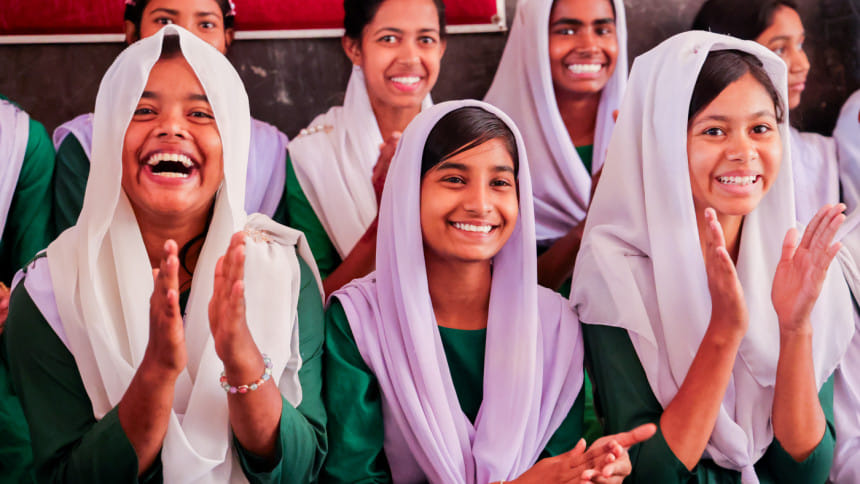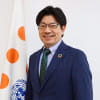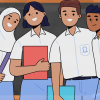Wellbeing education is a must for Bangladesh

No educator would deny the connection between adolescents' health and wellbeing and their academic success. In Bangladesh, schools are vital social institutions that safeguard girls and boys, providing a space for learning and opportunities for social transformation.
Yet today, Bangladesh is facing a crisis as millions of girls and boys are being denied the knowledge and life skills they need to make decisions about their bodies and futures. This is particularly serious for adolescent girls, as evidenced by the country's high rates of child marriage and teenage pregnancy—the highest in South Asia. The Violence Against Women Survey of 2024 reveals that 62 percent of married adolescent girls aged 15-19 experienced violence last year.
Dismantling the rigid gender norms and unequal power dynamics perpetuating this crisis requires urgent action, including a societal shift that prioritises adolescent girls' dignity, empowerment, and safety, as well as boys' mindsets and non-violent conflict resolution skills through transformative education. To achieve this, curriculum reform is essential. Equipping young people with knowledge about health, consent, and bodily autonomy is vital for ensuring protection for over 30 million adolescents. It is critical for breaking cycles of inequality and violence.
Last year, the 2012 curriculum was reinstated for the academic year 2025. As a result, the subject "Wellbeing" (Shashthyo Surokhya) also got excluded from the curriculum, which is concerning. It creates a fragmented approach to life skills and wellbeing education. This move contradicts the country's commitment to the Sustainable Development Goal on quality education (SDG 4), SDG 3 (good health and wellbeing), and SDG 5 (gender equality), as well as the global Education 2030 agenda. Neither does it align with the spirit of the 2024 mass uprising inspired by the principles of human rights, non-discrimination, inclusion, and systemic change that underpin education, health, and other opportunities that promote gender equality.
Introduced in schools in 2023 under the National Curriculum Framework 2021, the "Wellbeing" subject was crucial for fostering the holistic development of students in grades 6 to 9. It provided essential support for their physical and mental health while addressing vital topics like adolescent development and violence prevention. Rather than being removed, it should have been expanded to include other grades and additional competencies.
The almost universal recognition by UN member states of the critical importance of health and wellbeing education has been questioned in Bangladesh. Globally, the evidence is clear: prioritising life skills education results in lower violence rates and improved wellbeing. Integrating gender equality principles throughout the education system can effectively address early marriage and discriminatory practices, particularly against girls. In an era of misinformation and unequal access to education and opportunities, providing accurate, age- and developmentally appropriate information through a system that reaches the majority of young people is key to a successful, violence-free, and educated nation. While every country must tailor education to its context, the universal principle remains the same: a quality education must equip children with the tools to protect their rights and thrive. Health and wellbeing education, integrated with life skills and grounded in gender equality, is fundamental for an equitable society.
While different nations have diverse approaches to educational transformation, universal values prioritise students, ensuring their fundamental rights are protected while addressing local issues through innovation. The current landscape in Bangladesh presents a crucial opportunity for stakeholders—including policymakers, curriculum experts, and educators—to commit to and integrate wellbeing and life skills education built on the principle of gender equality. Health, wellbeing, and life skills education are not optional; they are fundamental. Empowering students with knowledge about their bodies, health, rights, and relationships enables them to challenge harmful gender norms and make informed choices about their relationships and life trajectories.
Bangladesh stands at a critical crossroads where strategic and evidence-based decisions regarding education can drive significant positive change. Therefore, drawing upon global best practices, UNFPA and UNESCO recommend establishing health and wellbeing as a distinct subject with specific teaching time allocated across all grade levels. This necessitates effective integration and implementation throughout all aspects of curriculum development, beginning with teacher training and extending to thorough assessment methods.
Amidst extensive discussions and debates about the future of Bangladesh and the proposed reform agenda, UNFPA and UNESCO urge all involved parties and stakeholders to prioritise adolescent girls and boys. They must ensure that these young people are not denied their fundamental rights to education and a life free from violence, stigma, discrimination, and inequality, as enshrined in the Universal Declaration of Human Rights. Integrating bodily autonomy, consent, mental resilience, and gender equality into the national curriculum is not merely a reform—it's a pathway to a thriving future for every child. The time for decisive action is now.
Masaki Watabe is representative ad interim for the United Nations Population Fund (UNFPA) in Bangladesh.
Dr Susan Vize is representative for the United Nations Educational, Scientific and Cultural Organization (UNESCO) in Bangladesh.
Views expressed in this article are the authors' own.
Follow The Daily Star Opinion on Facebook for the latest opinions, commentaries and analyses by experts and professionals. To contribute your article or letter to The Daily Star Opinion, see our guidelines for submission.

 For all latest news, follow The Daily Star's Google News channel.
For all latest news, follow The Daily Star's Google News channel. 







Comments